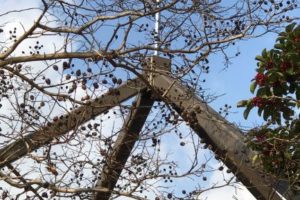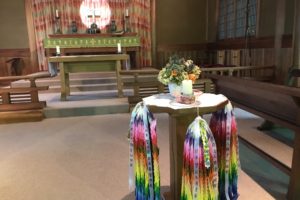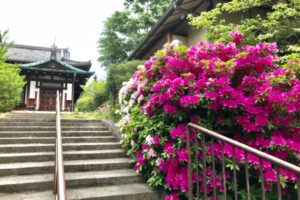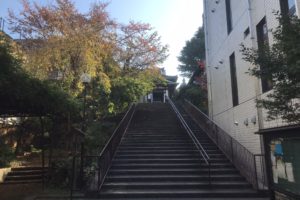by Rev. Misa Furumoto
Second Sunday of Advent in Year C, December 5, 2021
Gospel of Luke 3:1-6
Two Advent candles are lit; today is the second Sunday of Advent. We have less than three weeks until Christmas. The month of December is called “Shiwasu” in the Japanese traditional calendar, and it is said that this name originates from the month when monks are busy running east and west to deliver Buddhist sutras. But I think it is not only for monks, but for everyone, December is the busiest month of the year.
I always wish I could enjoy the time to prepare for Christmas, but I have never been able to do so. Every year, I’m overwhelmed with a long to-do list, asking myself how much time is left, and how I can hurry up and finish what I need to do. On Christmas day, I always feel just like a high school student who is always running late in the morning and makes it just in time for school. But for this year, I’m again wishing to spend the next three weeks with a peaceful mind, looking toward God and not just focusing on myself.
Today’s Gospel, as well as the 3rd Sunday of Advent next week, features John the Baptist. John was born by the work of God to an elderly couple, Zachariah and Elisabeth, who were relatives of Mother Mary, six months before Jesus was born to her. His birth is described in the chapter 1 of the same Luke’s Gospel, so please take this opportunity to read it again.
John was filled with the Holy Spirit even before he was born. God had given him a great mission which was to prepare the way for the Savior to come into the world; it was a grand plan of God since the time of the Old Testament. The Gospel according to Luke, which we just read, quotes the words of the prophet Isaiah in 40:3-5. In Isaiah, it is read:
A voice of one calling: “In the wilderness prepare the way for the Lord; make straight in the desert a highway for our God. Every valley shall be raised up, every mountain and hill made low; the rough ground shall become level, the rugged places a plain. And the glory of the Lord will be revealed, and all people will see it together.
This voice calling out in the wilderness is John. In order to show that this event was a historical fulfillment of God’s grand plan of salvation, Luke wrote a detailed historical background of Judea at that time, beginning with “In the fifteenth year of the reign of Emperor Tiberius…”. At one point in the long history of mankind, the Word of God fell on John in the wilderness. “Soon I will send my Son to be the Savior of all people. So you tell the people about it and let them get ready.”
The preparation for the Lord was to make roads in the wilderness, valleys to be filled, mountains and hills to be made low, crooked ways to be made straight, and rough ways to be made smooth. People with power and authority who mistakenly think they are God, and the rich who trample on the weak and accumulate wealth just for themselves, are compared to mountains and hills. And the poor who are discriminated against and oppressed in society and do not even have enough to eat today are compared to valleys. It is prophesied that, in order for the Savior to come and the Kingdom of God to be realized in this world, these valleys must be filled and the mountains and hills must be made low. And when that is accomplished, all the people living on this earth would see God’s salvation.
As to respond to the voice from God, John went to the region along the River Jordan and preached a baptism of repentance to people for the forgiveness of sins. Here we see three church terms: “forgiveness of sins,” “repentance,” and “baptism. All of these terms are very important for each of us who decides to follow Jesus, but we need to be careful because they can be interpreted in a very biased way.
First of all, “sin” does not refer to so-called social “crimes” that we think of like robbery and murder, but rather to the fact that our minds have drifted away from God, that we have forgotten His existence, and that we think we are living on our own. In the original language, it means “missing the point.” No matter what kind of saint you are, you cannot live your life thinking about God 24 hours a day, 365 days a year, and even if you think you are right, there are many things that are not so in God’s eyes. That’s what it means when we say, “We are all sinners.” It can also be said that we are all born sinners.
Next term is “repentance,” which does not simply mean admitting and say “I’m sorry” for each mistake we have made, but it means to change the direction we are standing in. Now we are turning our backs on God, but we are to turn toward Him. It is said that Advent is a time of repentance, and the purple color represents this.
And then, the third word is baptism. When you hear the phrase “baptism of repentance for the forgiveness of sins,” you may think that all your sins will be washed away and you will be instantly a clean slate. But that is not the case. Even after we are baptized, our hearts are still dark, as we all know. Rather, baptism is a response to God’s call, “Come back to me,” to which we say, “Yes, I’m home.” It is a sincere knowing and conviction that you have a place to return to. No matter what kind of person you are, God, without saying anything, embraces you in His big arms and says, “Welcome home”. This is forgiveness of sins in the true sense of the word.
On Sunday, the 26th, the day after Christmas, two people will be baptized in the Japanese service. I am really looking forward to it. If your time allows, please attend this Sunday service. When we hear them say “I’m home” to God, we also want to remember the day when we answered God’s call and feel the joy of being invited to the Lord’s house.
When we respond to God’s call, our way of life will be gradually changed. Isaiah’s words, “Every valley will be filled, and every mountain and hill will be made low,” are not only referring to the ideal society, but perhaps they are also describing our hearts. When you are crouching down in the depths of a valley feeling that you are no good, that you can do nothing, that no one loves you, and that there is no meaning or value to your life, God reaches down from above and pulls you up, saying, “Don’t worry, I love you, and I’m always with you. It’s okay to be just who you are”. At the same time, when you achieve something or succeed in something and think you have great power, Jesus reaches out His tiny hand from the manger of a poor stable in a low, low place and says, “Come down here. You can’t see me from up there.”
Christmas is only three weeks away. As John the Baptist told us, let’s turn to God and look around at the wilderness in our own hearts. It may be rocky, bumpy, and full of twists and turns. But God will come and make a flower of life bloom there. Let’s walk through the days leading up to Christmas with gratitude and hope.
In the name of the Father, of the Son, and of the Holy Spirit, Amen.













